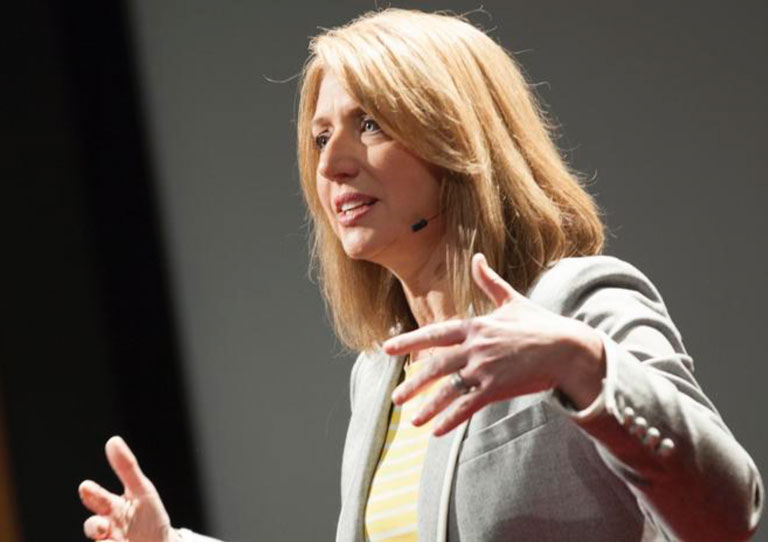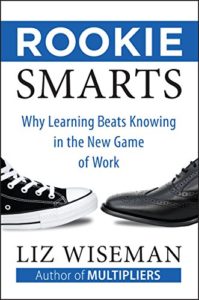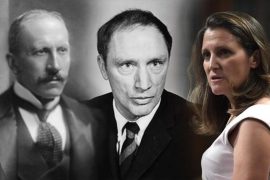by FirstRound
In 1989, Liz Wiseman took her first job out of business school at a mid-size startup called Oracle. With no previous experience, she was recruited as a technical trainer, charged with teaching programming to all of the company’s new engineering recruits. She admits she barely knew what the company did, much less how to teach engineers. A year later, she was promoted to manage the training department and make CEO Larry Ellison‘s vision for what he called ‘Oracle University’ a reality. She was 24.
“I really didn’t know what I was doing. All I knew was that this was a grown-up job and I wasn’t quite grown up yet, but no one seemed to be bothered by that but me,” says Wiseman. It was scary then, but looking back, she sees clearly how being a rookie made her an ideal candidate for the blue-sky project. “My real value didn’t come from having fresh ideas. It was having no ideas at all. When you know nothing you’re forced to create something.”
Little did she know that she’d spend the next 17 years leading the University effort and Oracle’s global human resources. Since then, Wiseman has written three books about what makes people effective as employees and leaders, and has conducted extensive research on how management can maximize performance inside organizations. Now president of the Wiseman Group, training executives around the world, she recently spoke at Stanford’s Entrepreneurship Corner and shared her findings about the advantages of the rookie mindset, how knowing too much can be dangerous for innovation, and what leaders can do to help everyone around them achieve their potential.
The Power of Being a Rookie
Harkening back to her experience spearheading Oracle University, Wiseman breaks down why her beginner’s mind was such a strength: “When you’re forced to create something and you don’t know how to do it, you go out and you ask,” she says. “All I knew was how important product knowledge transfer was inside of the company, so I went out and talked to every single one of the product bosses. I asked them what problems they had getting people to learn. I talked to the people who needed the knowledge.”
Based on these interviews, she knew she needed to keep things simple to lower the barrier to entry, and she needed to leverage the incredible amount of knowledge existing employees already had. “Instead of hiring instructors and technical experts that we’d need to bring up to speed, we went back to the product bosses and asked them to take on the additional responsibility of teaching trainings. We knew they’d be the best at it. It was the best, most accurate, fastest solution.”
Eventually, the program got so big that management made moves to replace Wiseman with a more seasoned executive, but the experts she had recruited to teach stepped in and demanded that she stay at her post. “It turned out that by not really knowing anything myself, I was able to stay much closer to all of the important stakeholders. And, because I needed to prove myself, we operated in thin slices — what we would today probably call a lean or agile approach — to deliver quick wins. We were giving people what they needed when they needed it because I knew no other way of working.”
When you’re a rookie, you’re also a pioneer. You’re out there on the frontier without confidence, so you have to focus on the basics. You end up operating very lean.
While researching her book ‘Rookie Smarts,’ Wiseman studied 400 different scenarios where people were new to something or not: Taking on pieces of work, debugging a program, writing a proposal, teaching a class, etc. Her team looked at how experienced people handled tasks and compared it to people doing them for the very first time. Here’s what she found:
Experience creates a number of blind spots. “With time, we obviously gain knowledge, wisdom and more data points to inform our power of intuition. We build confidence and networks, but we’re also creating blind spots.” When your mind recognizes a pattern, it tends to stop innovating. You’re no longer looking for outlier possibilities, you miss opportunities. Generally speaking, you stop making things up. You gloss over the gaps.
Studies have shown that if misspelled words are strung together in a sentence, people can still read them with ease because all that matter is the first and last letter of a word. Our brains fill in the rest. The same thing happens when we face situations where we have experience. Our automatic response is to reach for what we already know. “We start answering questions before they’ve been asked. We stop seeing new data points or contrary points of you. We stop seeking feedback and input from others.”
We develop scar tissue. The more experience you gain, the more likely you’ll have some bad experiences that will leave scars behind, continually reminding you of your mistakes. “I have a whole set of scars that remind me not to do things that didn’t seem to work out very well the first time,” Wiseman says. “You also have to realize that you will have ideas that touch on other people’s scar tissue. They will quickly say, ‘No, no, we tried that and it didn’t work.’ This is a major way that experience can create a number of troubling blind spots.”
Ignorance can drive top performance. “If you envision a really steep learning curve, it starts in a phase of ignorance, this really gentle part of the curve. This is where, even when we’re given important and hard tasks, we can say to ourselves, ‘How hard can this be? I can do it,’” says Wiseman. “It’s only when we start to dig in and become more aware that we realize how hard something is. We start seeing the gap between what we can do and what the people around us can do. Then we move into a state of desperation. We start to panic. We look around for someone who knows what they’re doing who can help. This is where we start to reach out.”
The most powerful form of learning comes when we’re desperate. When we have no choice but to learn.
Wiseman’s research showed that in fields requiring specialized knowledge, inexperienced people tend to outperform their experienced peers by a small margin. “But where they really outperform is when the work is innovative in nature,” she says. “Rookies are a lot faster than people with experience because they are desperate and uncomfortable. When we get comfortable, that’s when we start to teach and mentor other people.” But it’s also where people slow down and stop contributing as much.
“As I looked at top performing rookies, I found this really interesting type of person: the perpetual rookie. These are people who are successful professionals, leaders, entrepreneurs with years of mastery who, despite that, maintain their rookie smarts — their ability to think and approach their work as if they were doing it for the first time.” As she investigated the attributes of perpetual rookies, Wiseman identified several traits they have in common:
- They are risk mitigators, not risk takers. They learn how to operate in thin slices, test, and de-risk their progress.
- They are never satisfied. “There’s an abhorrence of mediocrity that they share.”
- They are curious. They always want to learn about everything, even if it’s not related to their job or immediate challenges.
- They are humble. “I don’t mean in the sense of low self-esteem. I mean willing to learn from anyone and everyone no matter where they are in the hierarchy.”
- They are playful. “It’s not like they try to create fun amid the work. For them, their work is just fun.”
So how can someone go about holding on to their rookie smarts? “As I looked across so many of these leaders and professionals, they all had a deliberate ritual — something that helped them go back to their rookie roots,” Wiseman says.
She cites Bob Hurley, founder of a surf company called Hurley Sports that eventually sold to Nike. “He said that at every juncture of building his business he had no idea what he was doing, and it turned out to be an advantage.”
When Hurley finds himself stuck in a rut, he thinks back to something that happened many years ago on Huntington Beach when he was an avid surfer himself. He ran into Wayne Bartholomew, the reigning world champion surfer at the time, who said he preferred surfing with beginners because they gave him energy. “So Bob told me, ‘Now when I have bad days, I go out and surf with the amateurs,'” Wiseman says. “He spends his time talking to them, hanging out with them, and he says it revitalizes his point of view.”
Do you find these posts helpful and informative? Please CLICK HERE to help keep us going!





